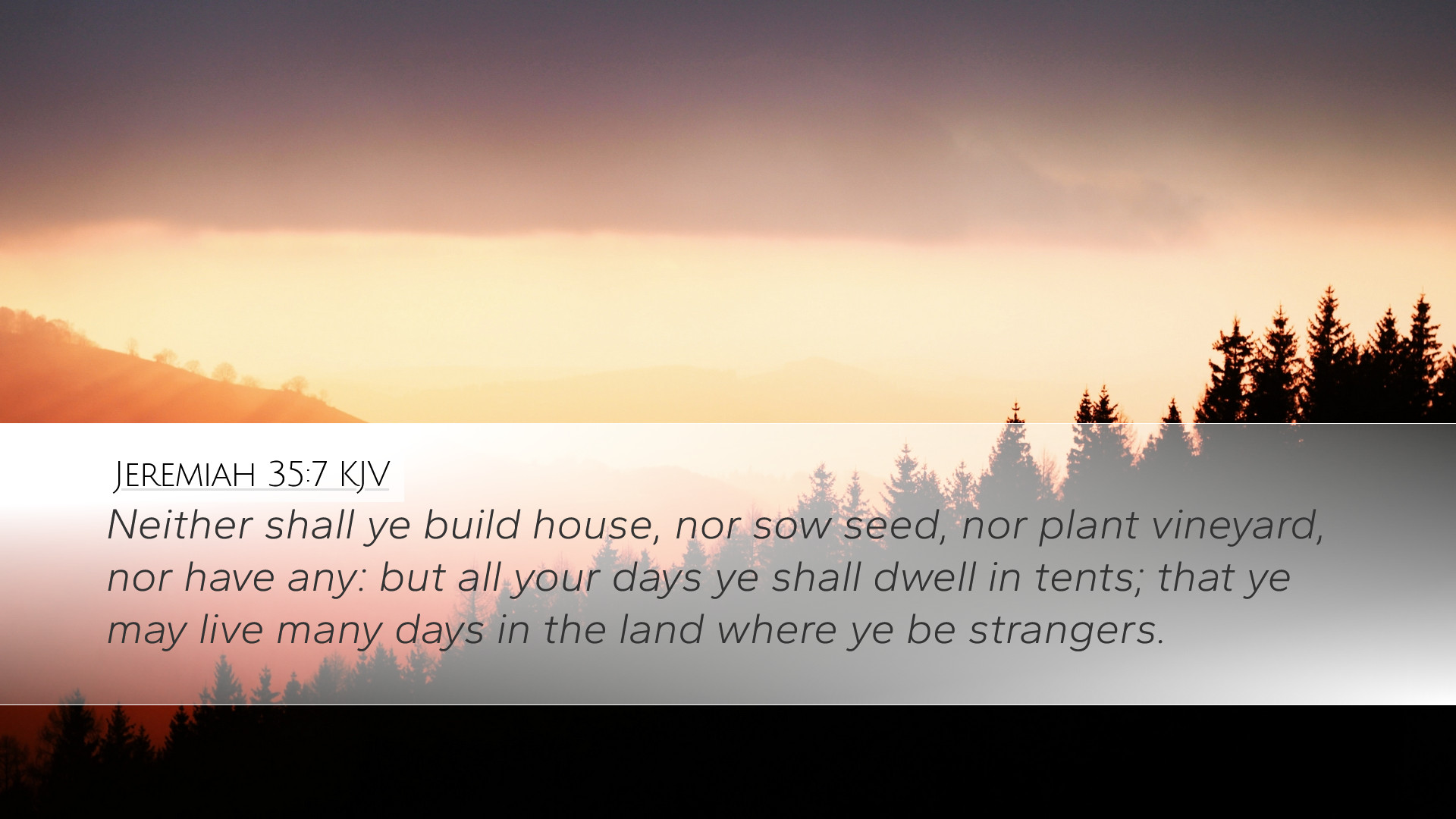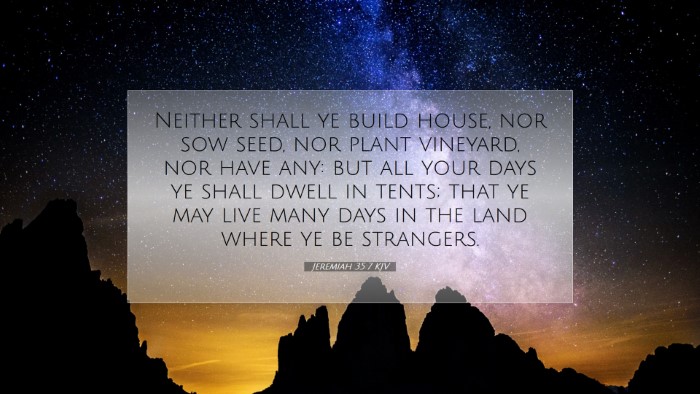Bible Commentary on Jeremiah 35:7
Verse Reference: Jeremiah 35:7
"Neither shall ye build house, nor sow seed, nor plant vineyard, nor have any: but all your days ye shall dwell in tents; that ye may live many days in the land where ye be strangers."
Contextual Background
The Book of Jeremiah addresses the themes of judgment and restoration, warning Israel of impending consequences due to their disobedience. Jeremiah 35 stands as a poignant reminder of faithfulness amidst difficulty, exemplified by the Rechabites, a group set apart from societal norms, adhering to their ancestral commands. This chapter serves as a narrative contrast to the disobedience of Israel.
Insights from Matthew Henry
Matthew Henry offers a penetrating insight into the significance of the Rechabites' adherence to their vows. He states that their lifestyle serves as a striking example of unwavering commitment to their forebearers' traditions, which symbolizes a broader lesson about loyalty and obedience to God’s commandments.
- Faithfulness: Henry highlights the Rechabites' faithfulness amidst a society of corruption. Their decision to live in tents, rather than settle in houses, was a testament to their commitment to their vows.
- Contrast with Israel: This faithfulness stands in stark contrast to the disobedience of the Israelites. While the Israelites abandoned God’s ways, the Rechabites maintained their traditions.
Insights from Albert Barnes
Albert Barnes focuses on the implications of the Rechabites' lifestyle and their obedience to their ancestors. According to Barnes, their unwavering intention to live as strangers reflects their spiritual wisdom and foresight.
- Understanding God's Commands: Barnes notes that the Rechabites understood the temporal nature of their existence—living in tents symbolizing their displacement and pilgrimage journey, indicative of the Christian pilgrimage through this world.
- A Call to Faith: By choosing a life of simplicity and obedience, the Rechabites serve not only as an example of moral integrity but also as a divine call for believers to prioritize spiritual over earthly pursuits.
Insights from Adam Clarke
Adam Clarke draws attention to the historical background behind the Rechabites and their vow. He emphasizes the role of Jonadab, the son of Rechab, in establishing their lifestyle commands, which were intended to separate them from the corruption surrounding them.
- Significance of the Tent Dwelling: Clarke elaborates that dwelling in tents was significant for their identity, representing both their dedication to God and their unique heritage. It served to permanently remind them of their transient nature and their waiting for the promise of God.
- Spiritual Application: Clarke encourages believers to reflect on their commitments to God, urging them to uphold their spiritual heritage, and live a lifestyle that reflects their faith—a life ‘in tents’ rather than grounded in worldly pursuits.
Theological Implications
Throughout the commentaries provided, several theological implications emerge from examining Jeremiah 35:7:
- Commitment to Tradition: There is a strong emphasis on the importance of adhering to God-given precepts, showcasing that traditions can serve to preserve spiritual truths.
- Holiness in Separation: The Rechabites exemplify holiness through separation from the practices of a corrupt society and remind believers to maintain fidelity to God.
- Christian Pilgrimage: The act of dwelling in tents resonates with the New Testament understanding of the believers’ journey as pilgrims, navigating through a world that is not their home.
Application for Believers
This passage invites reflection and application in the lives of modern believers, pastors, students, and theologians:
- Defined Lifestyle: Believers are called to define their lifestyle choices based on the teachings of their faith rather than societal expectations.
- Embrace Pilgrimage: Embracing the concept of living as sojourners encourages believers to invest in eternal treasures rather than temporary comforts.
- Legacy of Faith: This passage prompts a discussion on the legacy one leaves behind—the traditions of faith passed down through generations hold power and significance in shaping spiritual identities.
Conclusion
Ultimately, Jeremiah 35:7 serves as a powerful call to faithfulness and obedience, urging believers to reflect on the integrity of their commitments. The example of the Rechabites resonates with the Christian calling to live distinctively, grounded in the truth of God’s Word while awaiting the fulfillment of His promises. As we endeavor to walk in faith, may we be inspired by the life lessons from both the Rechabites and the essential truths drawn from the insights of Henry, Barnes, and Clarke.


